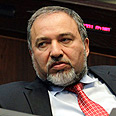
Lieberman fined again over poor Knesset attendance
Knesset's Ethics Committee deducts four days' pay from Yisrael Beiteinu chairman's wages for missing 22 plenum sessions
The Knesset's Ethics Committee sanctioned Yisrael Beiteinu Chairman Avigdor Lieberman Sunday, deducting four days' pay from his wages for missing 22 plenum sessions – four more than permitted.
The committee noted that last summer the Knesset had 37 sessions and stated that therefore the absence of Knesset members from more than 13 sessions, of a deputy minister of more than 15, and a minister of more than 19 – must have a reasonable explanation.
Related stories:
- FM fined over poor Knesset attendance
- MK Zoabi gets day's suspension over usher incident
- MK Michaeli suspended for one month
The committee pointed out that since it wasn't Lieberman's first warning for absenteeism it decided to deduct his wages.
"MK Lieberman told the committee his absences were due to state visits abroad," the committee's report mentioned. "According to him, as the foreign minister and the government's official representative he is required to go abroad in order to attend formal meetings with heads of state, foreign ministers, members of congress and other senior officials."
The committee noted its decision from October 2008 – when Lieberman failed to attend two meeting above the number permitted. The committee accepted his explanations that his role justifies his absence.
'No reasonable explanation'
"In its decision from June 2012 regarding attendance during the winter session," the report said, "the committee found that only 16 absences out of 38 were explained by official stays abroad, but the committee decided to consider his role as foreign minister and deduct his pay for four days only."
The committee mentioned that in this session as well Lieberman's absences due to official visits abroad were checked and it found that these only amounted to eight days of sessions, and do not explain his poor attendance. The committee therefore decided again to fine him for four days' pay.
Lieberman's office said in response that "Lieberman was at that time the foreign minister and the government's representative abroad. He was frequently required to go to state visits abroad, and to host leaders and foreign ministers even while the Knesset was in session, therefore he had to miss a few sessions.
"The Ethics Committee's decision isn't justified and hard to understand. Apparently its members gave more weight to political rather than ethical considerations."
- Receive Ynetnews updates directly to your desktop










